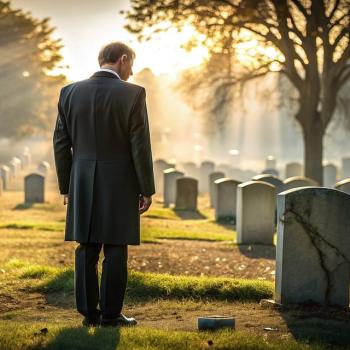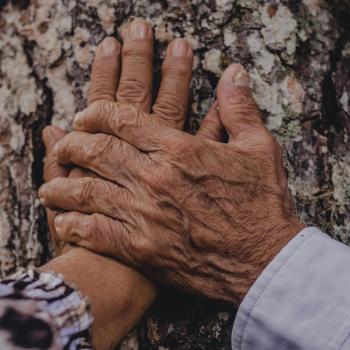It's hard to get people as excited about their blessings as they get about their troubles. As I contemplated how to write about 9/11 this week, I made the mistake of wondering, "What would Jesus write about?" The answer came immediately: "He'd write about the blessings we have at the hand of the Father."
Blessings? Who wants to write about blessings? It's easier to rally an audience around shared complaints and fears and resentments. Everyone has a ready opinion about what's wrong. Expressing oneself on that subject is a quick way of scratching an itch—and there is an awful lot of itch-scratching to be done about the tenth anniversary of 9/11. One dispute follows another; a decade's worth of disagreement, bemusement, and fraying of the social order results in people lining up and yelling "Bush!" and "Obama!" at each other. And the issues at stake do matter, whether they are relatively small, like the slow pace of the rebuilding effort in Manhattan, or relatively large, like what America's posture should be with the Islamic world.
But I was stuck. I had to write about the blessings. And I thought of the many Psalms in which the psalmist progresses joyfully through a list of God's works on behalf of his people. The ancient Hebrews were no strangers to terror and sorrow. The Psalms do not recount their blessings, or the mighty works of Jehovah, because the people of Israel had nothing else to think about. Slavery; harrowing brushes with disaster; the hatred of neighbors; invasion, conquest, near-constant war; corrupt and faithless rulers, societal breakdown, drought, famine, disease—the ancient Israelites endured it all. They had plenty to complain about, and, as the historical books of the Old Testament record, complain they did.
But the litanies preserved for posterity in the Psalms are about rescue, restoration, and renewal. They recount victories over evil and danger, protection through catastrophe and loss. They remind readers that God's power makes pathways out of peril and triumphs over terror. They remind us, in short, of who He is.
They challenge us, moreover, to decide if we believe in Him as He is. We can read the words, but do we believe in the promises? Psalm after psalm reminded the Israelites, in times of great peril, of what God had done for them in bringing them out of Egypt and establishing them in a new land. Was this a way of instructing the people to remember their days of hope and glory as they were slaughtered and pillaged at the hands of their enemies? No: it was a reminder that if they called on God, He would answer—and the scope of what He could do for them defied limitation.
God promised tremendous blessings to His people for keeping His law. He was also a refuge and a shield in times of trouble. Trouble would come, as it does in a world of evil and fallen freedom, but it would not overcome the people of God. On this tenth anniversary of 9/11, as Americans struggle with our political future and the world slips into a state of disorder we have not known since before World War II, the verses that stand out to me are in Psalm 34:19-22 (NIV):
The righteous person may have many troubles,
but the LORD delivers him from them all;
he protects all his bones,
not one of them will be broken.
Evil will slay the wicked;
the foes of the righteous will be condemned.
The LORD will rescue his servants;
no one who takes refuge in him will be condemned.
Especially interesting is the promise that not one of the righteous person's bones will be broken. In a literal sense, obviously, many righteous people's bones have been broken. But suppose we think of "bones" as a metaphor for a structure that holds us up and provides a basis for movement. We may at times lack the courage to rely on those "bones." Yet the march of time should convince us that they do, indeed, remain unbroken.
Ten years on from 9/11 we have behind us that day's terrible attack, two foreign wars, and numerous attempts to attack us again. There is social discord in our nation. A long-festering financial crisis and a series of confused and harmful government policies have eliminated investment capital, jobs, and much of our household wealth.
But we are still here. The sustained assault on our nation has not destroyed us. Even impoverished, we still have enough. But more importantly, we retain the unique intellectual freedom that allows each of us to seek God and relate to Him in the way that seems good to us. History is largely an account of the attempts by human organizations to interpose themselves between our consciences and God—but in spite of the continuousness and inevitability of those attempts, there arose a United States of America. And in spite of the many and varied attacks on our people and our idea of natural rights, we are still the nation where the conscience is free.





